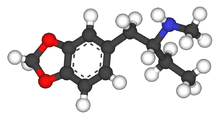1,3-Benzodioksolil-N-metilbutanamin

|

|
|
|
| Klinički podaci
|
| AHFS/Drugs.com
|
Monografija
|
| Identifikatori
|
| CAS broj
|
103818-46-8
|
| ATC kod
|
nije dodeljen
|
| PubChem[1][2]
|
124844
|
| ChemSpider[3]
|
111153
|
| Hemijski podaci
|
| Formula
|
C12H17NO2
|
| Mol. masa
|
207,269
|
| SMILES
|
eMolekuli & PubHem
|
| InChI |
|---|
InChI=1S/C12H17NO2/c1-3-10(13-2)6-9-4-5-11-12(7-9)15-8-14-11/h4-5,7,10,13H,3,6,8H2,1-2H3
Key: USWVWJSAJAEEHQ-UHFFFAOYSA-N  Y Y |
|
| Sinonimi
|
Methylbenzodioxolylbutanamine; N-Methyl-1,3-benzodioxolylbutanamine; MBDB; 3,4-Methylenedioxy-N-methyl-butanphenamine; MDMB
|
| Fizički podaci
|
| Tačka topljenja
|
156 °C (313 °F)
|
| Farmakoinformacioni podaci
|
| Trudnoća
|
?
|
| Pravni status
|
|
1,3-Benzodioksolil-N-metilbutanamin je organsko jedinjenje, koje sadrži 12 atoma ugljenika i ima molekulsku masu od 207,269 Da.
- ↑ Li Q, Cheng T, Wang Y, Bryant SH (2010). „PubChem as a public resource for drug discovery.”. Drug Discov Today 15 (23-24): 1052-7. DOI:10.1016/j.drudis.2010.10.003. PMID 20970519. edit
- ↑ Evan E. Bolton, Yanli Wang, Paul A. Thiessen, Stephen H. Bryant (2008). „Chapter 12 PubChem: Integrated Platform of Small Molecules and Biological Activities”. Annual Reports in Computational Chemistry 4: 217-241. DOI:10.1016/S1574-1400(08)00012-1.
- ↑ Hettne KM, Williams AJ, van Mulligen EM, Kleinjans J, Tkachenko V, Kors JA. (2010). „Automatic vs. manual curation of a multi-source chemical dictionary: the impact on text mining”. J Cheminform 2 (1): 3. DOI:10.1186/1758-2946-2-3. PMID 20331846. edit
- ↑ Ghose, A.K., Viswanadhan V.N., and Wendoloski, J.J. (1998). „Prediction of Hydrophobic (Lipophilic) Properties of Small Organic Molecules Using Fragment Methods: An Analysis of AlogP and CLogP Methods”. J. Phys. Chem. A 102: 3762-3772. DOI:10.1021/jp980230o.
- ↑ Tetko IV, Tanchuk VY, Kasheva TN, Villa AE. (2001). „Estimation of Aqueous Solubility of Chemical Compounds Using E-State Indices”. Chem Inf. Comput. Sci. 41: 1488-1493. DOI:10.1021/ci000392t. PMID 11749573.
- ↑ Ertl P., Rohde B., Selzer P. (2000). „Fast calculation of molecular polar surface area as a sum of fragment based contributions and its application to the prediction of drug transport properties”. J. Med. Chem. 43: 3714-3717. DOI:10.1021/jm000942e. PMID 11020286.


